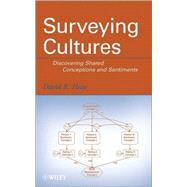
What is included with this book?
| Preface | p. ix |
| Acknowledgments | p. xi |
| Surveying Culture | p. 1 |
| Case Studies of Cultural Surveys | p. 3 |
| Preview | p. 18 |
| Chapter Highlights | p. 20 |
| Measuring Sentiments | p. 23 |
| Dimensions of Affect | p. 26 |
| Bipolar Scales | p. 35 |
| Internet Data Collection | p. 51 |
| Chapter Highlights | p. 54 |
| Sentiment Repositories | p. 57 |
| Early Archives | p. 58 |
| Cross-Cultural Atlas | p. 60 |
| Archives Related to Social Interaction | p. 61 |
| U.S. 2002-2004 Project | p. 67 |
| Chapter Highlights | p. 73 |
| Surveys with Vignettes | p. 75 |
| Factorial Surveys | p. 76 |
| Impressions from Events | p. 86 |
| Attribute-Identity Amalgamations | p. 98 |
| Event Likelihoods | p. 101 |
| Synopsis | p. 106 |
| Chapter Highlights | p. 108 |
| Appendix: Impression-Formation Study Designs | p. 109 |
| Errors in Surveys | p. 121 |
| Coverage Errors | p. 122 |
| Sampling Errors | p. 124 |
| Nonresponse Errors | p. 124 |
| Measurement Errors | p. 125 |
| Other Errors | p. 129 |
| A Survey-of-Cultures Model | p. 129 |
| Statistics | p. 135 |
| Inculcation Index | p. 139 |
| Commonality Index | p. 141 |
| Variance Components | p. 142 |
| Implications | p. 144 |
| Chapter Highlights | p. 146 |
| Correlates of Enculturation | p. 149 |
| Indices | p. 150 |
| Conduct as a Rater | p. 151 |
| Predicting Cultural Authoritativeness | p. 153 |
| Implications | p. 160 |
| Chapter Highlights | p. 164 |
| Consensus in Sentiments | p. 167 |
| Component Analyses | p. 168 |
| Subcultures | p. 176 |
| Discussion | p. 179 |
| Chapter Highlights | p. 180 |
| Measurement Reliability | p. 183 |
| Reliabilities Within Stimuli | p. 184 |
| Reliabilities Across Stimuli | p. 194 |
| Chapter Highlights | p. 200 |
| Culture and Surveys | p. 203 |
| Unique Aspects of Sentiment Surveys | p. 203 |
| Frameworks for Sentiment Surveys | p. 207 |
| In Closing | p. 210 |
| Chapter Highlights | p. 211 |
| References | p. 213 |
| Index | p. 223 |
| Table of Contents provided by Ingram. All Rights Reserved. |
The New copy of this book will include any supplemental materials advertised. Please check the title of the book to determine if it should include any access cards, study guides, lab manuals, CDs, etc.
The Used, Rental and eBook copies of this book are not guaranteed to include any supplemental materials. Typically, only the book itself is included. This is true even if the title states it includes any access cards, study guides, lab manuals, CDs, etc.